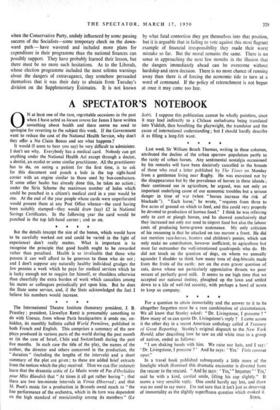Last week Sir William Beach Thomas, writing in these columns,
attributed the decline of the urban sparrow population partly to the rarity of urban horses. Any sentimental nostalgia occasioned by his remarks will have been decisively cancelled in the breasts of those who read a letter published by The Times on Monday from a gentleman living near Rugby. He was exercised not by the disappearance but by the prevalence of horses in these islands ; their continued use in agriculture, he argued, was not only an important underlying cause of our economic troubles but a serious danger in time of war (when " horses increase the risk of blockade "). " Each horse," he wrote, " requires from three to five acres of ground on which to feed, and this could very properly be devoted to production of human food." I think he was referring only to cart or plough horses, and he showed conclusively that they increased not only our need to import food but also the labour costs of producing home-grown sustenance. My only criticism of his reasoning is that he attacked on too narrow a front. He did not mention race-horses, hunters and children's ponies, which not only make no contribution, however inefficient, to agriculture but must far outnumber the well-intentioned quadrupeds who do. He did not touch on the question of dogs, on whom we annually squander I shudder to think how many tons of dog-biscuits made from the fruits of the earth: nor on the even graver question of cats, down whose not particularly appreciative throats we pour oceans of perfectly good milk. It seems to me high time that we accepted our national destiny, ploughed up the lawn and settled down to a life of well-fed security, with perhaps a bowl of newts to keep us company.
* * * *


































 Previous page
Previous page